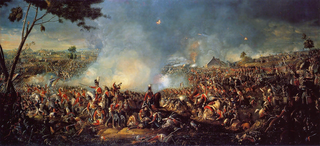After 18 June 1815 numerous British ships have been named Waterloo for the British victory at the Battle of Waterloo:

The Battle of Waterloo was fought on Sunday, 18 June 1815 near Waterloo in Belgium, part of the United Kingdom of the Netherlands at the time. A French army under the command of Napoleon Bonaparte was defeated by two of the armies of the Seventh Coalition: an army consisting of units from Britain, Ireland, the German Legion, the Netherlands, Hanover, Brunswick and Nassau, under the command of the Duke of Wellington, referred to by many authors as the Anglo-allied army, and a Prussian army under the command of Field Marshal Blücher. The battle marked the end of the Napoleonic Wars.
- Waterloo (1815 ship) was a merchant ship built at Bristol, England in 1815. On her first voyage she suffered a short-lived mutiny. She then made one voyage under charter to the British East India Company (EIC). She made four voyages transporting convicts from England to Australia, and two voyages from Ireland to Australia. On her seventh convict voyage Waterloo wrecked on 28 August 1842 in Table Bay with great loss of life.
- Waterloo (1815 Bideford ship) was launched at Bideford, originally as a West Indiaman. Between 1817 and 1821 she made three voyages to India. She then returned to the West Indies trade. Her crew abandoned her at sea in 1829.
- Waterloo (1815 New Brunswick ship), launched at St. Martins, New Brunswick. She was last listed in 1848.
- Waterloo (1815 Plymouth ship) was launched at Plymouth. She made two voyages to India. Heavy seas in October 1820 so damaged her that her crew had to abandon her in the North Atlantic.
- Waterloo (1815 Sunderland ship), launched at Sunderland, was wrecked in October 1821 at Fishhook Bay, Cape of Good Hope.
- Waterloo (1815 Yarmouth ship), was launched at Yarmouth. She sailed first as a West Indiaman. After a mishap in 1822 she was returned to service and traded with the Mediterranean and South America. She was briefly a coaster sailing out of Lynn until she foundered in August 1833.
- Waterloo (1816 EIC ship), was launched at London and made nine voyages for the EIC before she was broken up in 1834.

Waterloo was a merchant ship built at Bristol, England in 1815. On her first voyage she suffered a short-lived mutiny. She then made one voyage under charter to the British East India Company (EIC). She made four voyages transporting convicts from England to Australia, and two voyages from Ireland to Australia. On her seventh convict voyage Waterloo wrecked on 28 August 1842 in Table Bay with great loss of life.

Bristol is a city and county in South West England with a population of 463,400. The wider district has the 10th-largest population in England. The urban area population of 724,000 is the 8th-largest in the UK. The city borders North Somerset and South Gloucestershire, with the cities of Bath and Gloucester to the south-east and north-east, respectively. South Wales lies across the Severn estuary.

The East India Company (EIC), also known as the Honourable East India Company (HEIC), East India Trading Company (EITC), or the British East India Company, and informally known as John Company, Company Bahadur, or simply The Company, was an English and later British joint-stock company. It was formed to trade in the Indian Ocean region, initially with Mughal India and the East Indies, and later with Qing China. The company ended up seizing control of large parts of the Indian subcontinent, colonised parts of Southeast Asia, and colonised Hong Kong after a war with Qing China.
